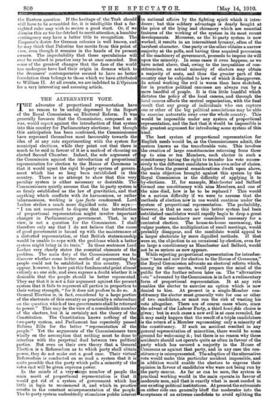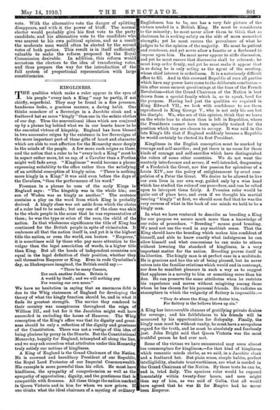THE ALTERNATIVE VOTE. T HE advocates of proportional representation have no
reason to be unduly depressed by the Report of the Royal Commission on Electoral Reform. It was generally foreseen that the Commission, composed as it was, would report against the introduction of that system into this country for Parliamentary elections ; but though this anticipation has been confirmed, the Commissioners have expressed themselves most favourably towards the idea of at any rate experimenting with the system for municipal elections, while they point out that there is much to be said in favour of it as a method of choosing an elected Second Chamber. Indeed, the sole argument of the Commission against the introduction of proportional representation for election to the House of Commons is that it would upset the rigid bi-party system of govern- ment which has so lows been established in this country. There is no attempt to show that this very peculiar system is either necessary or desirable. The Commissioners quietly assume that the bi-party system is as firmly established as the law of gravitation, and that anything which conflicts with its harmonious, or rather inharmonious, working is ipso facto condemned. Lord Lochee strikes a much more dignified note. He says :— "I am not concerned to dispute that the introduction of proportional representation might involve important changes in Parliamentary government. That, in my view, is not a question for the Commission. I shall therefore only say that I do not believe that the cause of good government is bound up with the maintenance of a distorted representation, or that British statesmanship would be unable to cope with the problems which a better system might bring in its train." In these sentences Lord Lochee very clearly states the essential elements of the problem. The main duty of the Commissioners was to discover whether some better method of representing the people could not be established in this country. They appear, hawever, to have put this fundamental point almost entirely on one side, and even express a doubt whether it is desirable that the people should be better represented. They say that it is not a fair argument against the present system that it fails to represent all parties in proportion to their voting strength, "for it does not profess to do so. A General Election is, in fact, considered by a large portion of the electorate of this country as practically a referendum on the question which of two governments shall be returned to power." This may be the view of a considerable number of the electors, but it is certainly not the theory of the Constitution. The Constitution knows nothing of the two-party system, and Parliament has repeatedly passed Reforin Bills for the better "representation of the people." Yet the arguments of the Commissioners turn wholly on the assumption that nothing must be done to interfere with the perpetual duel between two political parties. But even on their own theory that a General Election is a Referendum as to which party shall obtain power, they do not make out a good case. Their virtual Referendum is conducted on so mad a system that it is quite possible that the party which polls a minority of the votes cast will be given supreme power.
In the minds of a very adarge number of people the main merit of proportional representation is that it would get rid of a system of government which has little in logic to recommend it, and which in practice results in the constant misrepresentation of the people. The hi-party system undoubtedly stimulates public interest in national affairs by the fighting spirit which it intro- duces; but this solitary advantage is dearly bought at the price of the lying and chicanery which are essential features of the working of the system in its most recent developments. Moreover, as the bi-party system is now worked, it results in an intermittent tyranny, often of the harshest character. One party or the other obtains a. narrow majority at the polls, and having thus acquired possession of the machinery of government, proceeds to impose its will upon the minority. In some cases it even happens, as we have noted above, that., owing to the inequalities of con- stituencies, an actual minority of electors may obtain a majority of seats, and thus the greater part of the country may be subjected to laws of which it disapproves. In actual working the evil is worse than here sketched, for in practice political caucuses are always run by a. mere handful of people. It is this little handful which dictates the policy of the local caucus, and through the local caucus affects the central organisation, with the final result that any group of individuals who can capture one or other of the big political associations may be able to exercise autocratic sway over the whole country. This would be impossible under any system of proportional representation, and the fact that it would be impossible is the greatest argument for introducing some system of this kind.
The best system of proportional representation for English needs would be, as the Commissioners admit, the system known as the transferable vote. This involves the creation of large constituencies returning from three up to nine or ten Members, each elector in such a constituency having the right to transfer his vote succes- sively to the different candidates in his own order of choice. Apart from the general considerations dwelt upon above, the main objection brought against this system by the Royal Commission is the difficulty of applying it to by-elections. If, for example, Manchester and Salford formed one constituency with nine Members, and one of the nine died, how is he to be replaced ? This would be a serious difficulty if we were to assume that the methods of election now in use would continue under the system of proportional representation. The probability, however, is that as soon as this better system had been established candidates would rapidly begin to drop a great deal of the machinery now considered necessary for a. contested election. The house-to-house canvassing, the vulgar posters, the multiplication of small meetings, would probably disappear, and the candidate would appeal to a larger electorate by more dignified methods. If that were so, the objection to an occasional by-election, even for so large a constituency as Manchester and Salford, would not be so serious as now appears.
While rejecting proportional representation for introduc- tion "here and now for election to the House of Commons," the Royal Commission advocate an electoral reform which, among its other merits, would prepare the mind of the public for the further reform later on. The "alternative vote" advocated by the Commission is in fact a rudimentary form of proportional representation. It at any rate enables the elector to exercise an option which is now denied to him. At present in a single-Member con- stituency the elector must generally vote for one or other of two candidates, or must run the risk of wasting his vote altogether. There are of course cases where, since the advent of the Labour Party, a third band-fide choice is given ; but in such eases a, new evil is at once revealed, for it may easily happen that the result of a triple candidature is the return of a Member representing only a minority of the constituency. If such an accident resulted in any general representation of minorities, there would be some ground for welcoming it ; but there is no reason why these accidents should not operate quite as often in favour of the party which has secured a majority in the House of Commons as against that party, and in any case the con- stituency is misrepresented. The adoption of the alternative vote would make this particular accident impossible, and in addition would enable the electors to express their opinion in favour of candidates who were not being run by the party caucus. As far as can be seen, the system in practical working would in the main operate in favour of moderate men, and that is exactly what is most needed in our existing political institutions. .A_t present the extremists on either aide can generally bluff the moderates into the acceptance of an extreme candidate to avoid splitting the
vote. With the alternative vote the danger of splitting disappears, and with it the power of bluff. The normal elector would probably give his first vote to the party candidate, and his alternative vote to the candidate who was nearest to his own political opinion, and as a result the moderate man would often be elected by the second votes of both parties. This result is in itself sufficiently valuable to make the reform proposed by the Royal Commission desirable. In addition, this reform would accustom the electors to the idea of transferring votes, and. thus prepare the way for the introduction of the full system of proportional representation with large constituencies.







































 Previous page
Previous page